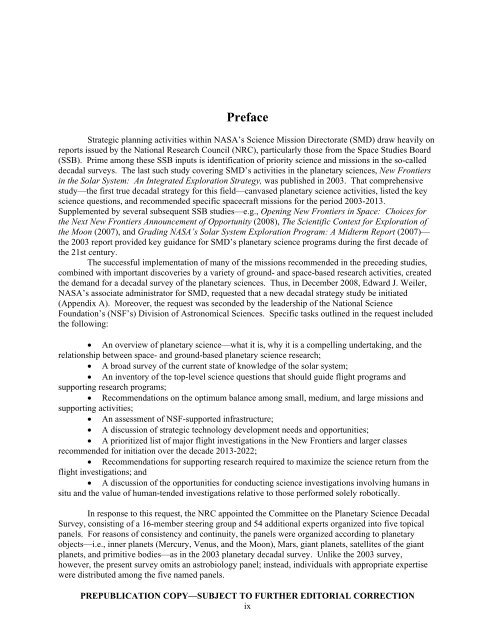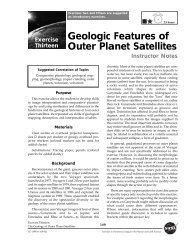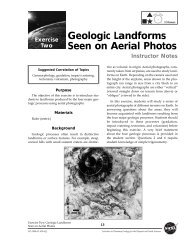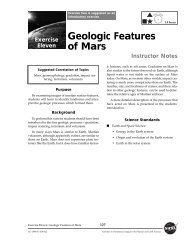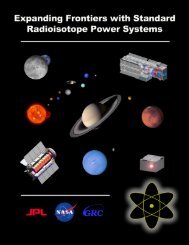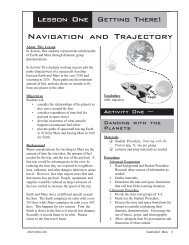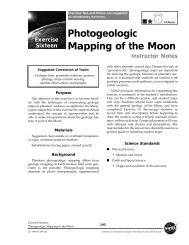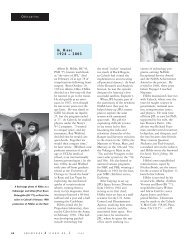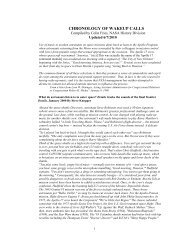Vision and Voyages for Planetary Science in the - Solar System ...
Vision and Voyages for Planetary Science in the - Solar System ...
Vision and Voyages for Planetary Science in the - Solar System ...
You also want an ePaper? Increase the reach of your titles
YUMPU automatically turns print PDFs into web optimized ePapers that Google loves.
Preface<br />
Strategic plann<strong>in</strong>g activities with<strong>in</strong> NASA’s <strong>Science</strong> Mission Directorate (SMD) draw heavily on<br />
reports issued by <strong>the</strong> National Research Council (NRC), particularly those from <strong>the</strong> Space Studies Board<br />
(SSB). Prime among <strong>the</strong>se SSB <strong>in</strong>puts is identification of priority science <strong>and</strong> missions <strong>in</strong> <strong>the</strong> so-called<br />
decadal surveys. The last such study cover<strong>in</strong>g SMD’s activities <strong>in</strong> <strong>the</strong> planetary sciences, New Frontiers<br />
<strong>in</strong> <strong>the</strong> <strong>Solar</strong> <strong>System</strong>: An Integrated Exploration Strategy, was published <strong>in</strong> 2003. That comprehensive<br />
study—<strong>the</strong> first true decadal strategy <strong>for</strong> this field—canvased planetary science activities, listed <strong>the</strong> key<br />
science questions, <strong>and</strong> recommended specific spacecraft missions <strong>for</strong> <strong>the</strong> period 2003-2013.<br />
Supplemented by several subsequent SSB studies—e.g., Open<strong>in</strong>g New Frontiers <strong>in</strong> Space: Choices <strong>for</strong><br />
<strong>the</strong> Next New Frontiers Announcement of Opportunity (2008), The Scientific Context <strong>for</strong> Exploration of<br />
<strong>the</strong> Moon (2007), <strong>and</strong> Grad<strong>in</strong>g NASA’s <strong>Solar</strong> <strong>System</strong> Exploration Program: A Midterm Report (2007)—<br />
<strong>the</strong> 2003 report provided key guidance <strong>for</strong> SMD’s planetary science programs dur<strong>in</strong>g <strong>the</strong> first decade of<br />
<strong>the</strong> 21st century.<br />
The successful implementation of many of <strong>the</strong> missions recommended <strong>in</strong> <strong>the</strong> preced<strong>in</strong>g studies,<br />
comb<strong>in</strong>ed with important discoveries by a variety of ground- <strong>and</strong> space-based research activities, created<br />
<strong>the</strong> dem<strong>and</strong> <strong>for</strong> a decadal survey of <strong>the</strong> planetary sciences. Thus, <strong>in</strong> December 2008, Edward J. Weiler,<br />
NASA’s associate adm<strong>in</strong>istrator <strong>for</strong> SMD, requested that a new decadal strategy study be <strong>in</strong>itiated<br />
(Appendix A). Moreover, <strong>the</strong> request was seconded by <strong>the</strong> leadership of <strong>the</strong> National <strong>Science</strong><br />
Foundation’s (NSF’s) Division of Astronomical <strong>Science</strong>s. Specific tasks outl<strong>in</strong>ed <strong>in</strong> <strong>the</strong> request <strong>in</strong>cluded<br />
<strong>the</strong> follow<strong>in</strong>g:<br />
• An overview of planetary science—what it is, why it is a compell<strong>in</strong>g undertak<strong>in</strong>g, <strong>and</strong> <strong>the</strong><br />
relationship between space- <strong>and</strong> ground-based planetary science research;<br />
• A broad survey of <strong>the</strong> current state of knowledge of <strong>the</strong> solar system;<br />
• An <strong>in</strong>ventory of <strong>the</strong> top-level science questions that should guide flight programs <strong>and</strong><br />
support<strong>in</strong>g research programs;<br />
• Recommendations on <strong>the</strong> optimum balance among small, medium, <strong>and</strong> large missions <strong>and</strong><br />
support<strong>in</strong>g activities;<br />
• An assessment of NSF-supported <strong>in</strong>frastructure;<br />
• A discussion of strategic technology development needs <strong>and</strong> opportunities;<br />
• A prioritized list of major flight <strong>in</strong>vestigations <strong>in</strong> <strong>the</strong> New Frontiers <strong>and</strong> larger classes<br />
recommended <strong>for</strong> <strong>in</strong>itiation over <strong>the</strong> decade 2013-2022;<br />
• Recommendations <strong>for</strong> support<strong>in</strong>g research required to maximize <strong>the</strong> science return from <strong>the</strong><br />
flight <strong>in</strong>vestigations; <strong>and</strong><br />
• A discussion of <strong>the</strong> opportunities <strong>for</strong> conduct<strong>in</strong>g science <strong>in</strong>vestigations <strong>in</strong>volv<strong>in</strong>g humans <strong>in</strong><br />
situ <strong>and</strong> <strong>the</strong> value of human-tended <strong>in</strong>vestigations relative to those per<strong>for</strong>med solely robotically.<br />
In response to this request, <strong>the</strong> NRC appo<strong>in</strong>ted <strong>the</strong> Committee on <strong>the</strong> <strong>Planetary</strong> <strong>Science</strong> Decadal<br />
Survey, consist<strong>in</strong>g of a 16-member steer<strong>in</strong>g group <strong>and</strong> 54 additional experts organized <strong>in</strong>to five topical<br />
panels. For reasons of consistency <strong>and</strong> cont<strong>in</strong>uity, <strong>the</strong> panels were organized accord<strong>in</strong>g to planetary<br />
objects—i.e., <strong>in</strong>ner planets (Mercury, Venus, <strong>and</strong> <strong>the</strong> Moon), Mars, giant planets, satellites of <strong>the</strong> giant<br />
planets, <strong>and</strong> primitive bodies—as <strong>in</strong> <strong>the</strong> 2003 planetary decadal survey. Unlike <strong>the</strong> 2003 survey,<br />
however, <strong>the</strong> present survey omits an astrobiology panel; <strong>in</strong>stead, <strong>in</strong>dividuals with appropriate expertise<br />
were distributed among <strong>the</strong> five named panels.<br />
PREPUBLICATION COPY—SUBJECT TO FURTHER EDITORIAL CORRECTION<br />
ix


